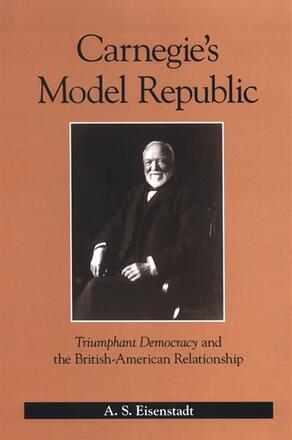
Carnegie's Model Republic
Triumphant Democracy and the British-American Relationship
Alternative formats available from:
Examines Carnegie’s book Triumphant Democracy and his efforts to promote closer ties between America and Britain.
Description
Andrew Carnegie (1835–1919) has long been known as a leading American industrialist, a man of great wealth and great philanthropy. What is not as well known is that he was actively involved in Anglo-American politics and tried to promote a closer relationship between his native Britain and the United States. To that end, Carnegie published Triumphant Democracy in 1886, in which he proposed the American federal republic as a model for solving Britain's unsettling problems. On the basis of his own experience, Carnegie argued that America was a much-improved Britain and that the British monarchy could best overcome its social and political turbulence by following the democratic American model. He expressed a growing belief that the antagonism between the two nations should be supplanted by rapprochement. A. S. Eisenstadt offers an in-depth analysis of Triumphant Democracy, illustrating its importance and illuminating the larger current of British-American politics between the American Revolution and World War I and the fascinating exchange about the virtues and defects of the two nations.
A. S. Eisenstadt is Professor Emeritus of History at Brooklyn College and the author and editor of several books, including Reconsidering Tocqueville's Democracy in America.
Reviews
"A. S. Eisenstadt knows a lot about the politics of England and the United States in the nineteenth century, and his book sheds new light on one of the most important relationships in world history. Making superb use of reviews of Carnegie's Triumphant Democracy (on both sides of the Atlantic), Eisenstadt explains why so many English critics viewed him as a radical, while those in the United States branded him a conservative. Along the way, Eisenstadt discusses many questions that will resonate with readers: the American republic as a model; the relationship between democracy, capitalism, and prosperity; and the special relationship between England and the United States." — Glenn C. Altschuler, coauthor of Rude Republic: Americans and Their Politics in the Nineteenth Century